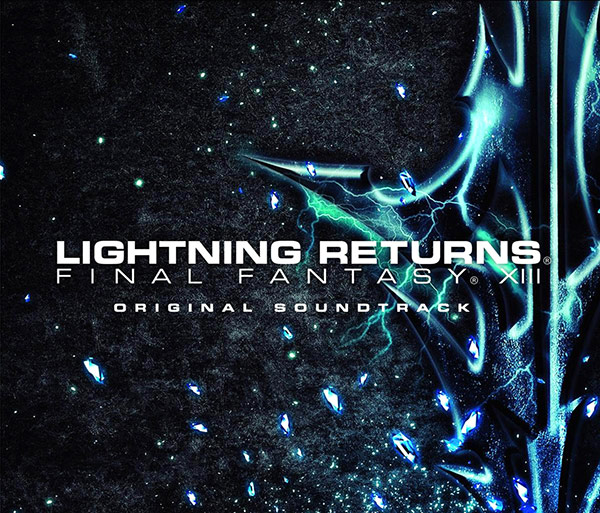Shackled by capricious gods and forced to play puppet in their schemes, Lightning is a woman whose entire adult life has been a battle against an unjust fate. Her involuntary journey across time, space, and worlds has at last reached its end with the release of Lightning Returns: Final Fantasy XIII. The game’s setting, Nova Chrysalia, is a world steeped in darkness and divinity alike, birthed from Chaos and doomed to an imminent end. With these qualities clearly in mind, veteran Square Enix composers Hamauzu, Mizuta, and Suzuki have created a complex and pervasively melancholy musical climax befitting the final chapter of the Final Fantasy XIII trilogy.
Unlike Final Fantasy XIII-2‘s soundtrack, which was excellent but decidedly eclectic, the music for Lightning Returns retains a unified vision of a world that is at once pre- and post-apocalyptic. It is a seductive synthesis of atmosphere and melody, of Western and Eastern RPG music sensibilities working in tandem.
Each one of the four regions in Nova Chrysalia has a distinct flavor and thematic presentation, but the music still feels cohesive. Luxerion is a city of darkness and light in equal parts, represented by the nominal “Luxerion” and jazzy “Midnight Eternal.” The uncharted sands and forgotten relics of the Dead Dunes are highlighted by exotic tracks like “Desert Awakening” and “Treasures Within.” Nature reigns supreme in The Wildlands, where “Prowlers of the Night” roam free and woodwind melodies like “Sunset Path” are carried on the wind. Finally, ultra-catchy “The Glittering City of Yusnaan” plays in — you guessed it — Yusnaan, where the people celebrate endlessly to the tune of “City of Revelry.” Despite the dramatic tonal difference between each of these places, the music for each is consistently great and complementary.
Recurring motifs are abundant in this soundtrack, and they work to great effect. The composers build upon two games’ worth of musical history by alluding to past character themes in a variety of evocative ways. Lightning herself has a myriad of tracks that explore her personality and new role as the savior of humanity’s souls. “Lightning’s Theme,” the basis for the widely beloved “Blinded by Light,” makes numerous appearances throughout all four discs. “Lightning’s Theme – A Distant Glimmer” uses gentle piano and violin to portend a hopeful future for the heroine, while “Lightning’s Theme – Radiance” features the same instruments but has an almost mournful quality. Her theme’s key phrase can also be found in “Chaos,” “Crimson Blitz,” “High Voltage,” “The Song of the Savior – The Chosen One -,” and “The Song of the Savior – Grand Finale -,” among others. My favorite among these is “Savior of Souls,” a high-octane guitar/synth battle track with a goosebump-inducing violin melody.
Other important characters get a chance to shine, too. “Fang’s Theme – The Boss -” highlights her brusque manner and imposing presence with deep notes and masculine chanting. “Sazh & Dajh” juxtaposes playfulness with tenderness, mirroring Sazh’s love for and devotion to his son. “Snow’s Theme – Final Words -” deconstructs the so-called hero’s original bombastic theme by replacing it with acoustic guitar and piano, demonstrating his maturation, while “Lumina’s Theme” is a play on Lightning’s Theme with piano as discordant and mysterious as the Farron-lookalike’s very existence. Serah’s time-traveling companion is no longer the upbeat man he once was, as evidenced by the gloom of “Noel’s Theme – The Shadow Hunter -.” Among these character themes, “Noel and Yeul – The Promise -,” stands out as especially poignant. Bassy piano and haunting, echoing vocals draw attention to the sadness that permeates the relationship between these two friends. I can only hope their story ends at the opposite end of the emotional spectrum.
The latter half of the final disc is worthy of extra praise for its sheer emotional intensity. “Divine Love,” the precursor to Lightning’s ultimate confrontation, is one of Mizuta’s best tracks yet. “Almighty Bhunivelze,” which I can only imagine is the final boss theme, is a thirteen-minute dramatic orchestral onslaught complete with organs and choir that reuses the motif from “The Ark.” It is leagues above the somewhat ambivalent “Nascent Requiem” from FFXIII and easily on pair with “Invisible Depths” from FFXIII-2. Following this is the climactic “Last Resort,” a frenetic electro/orchestra track that once again makes use of Lightning’s Theme before transitioning into an ethereal melody that ends the song gently. “Humanity’s Tale” and “Credits – Light Eternal” bring the soundtrack to a perfect close by recalling the motif from what is arguably the series’ main theme, “The Promise,” in addition to several other character themes and tracks from this very album. For fans who have stuck with Final Fantasy XIII all these years, it is an immensely satisfying payoff.
There are a couple of stumbles on the album, admittedly. “The Savior’s Words” and “Desert Lullaby” feature male vocals that come off somewhat awkwardly. Several of the more ambient tracks can also blur together, making it hard to identify them from one another without a strong visual memory to attach. I’m also not too taken with “Marimba de Chocobo,” mostly due to its predictable progression. These hiccups do little to take away from the soundtrack as a whole, however.
The soundtrack for Lightning Returns: Final Fantasy XIII is the musical culmination of both Lightning’s story and the series’ mythos. I should add that the production quality is outstanding, making this music best appreciated with a pair of quality headphones. I suspect some fans may be taken aback by the departure in tone from XIII and XIII-2‘s soundtracks, but there is a whole lot to love across this 74-track behemoth (pun intended) of an album. When Lightning makes her return next February in North America, I’ll be there on day one to see how the tale unfolds.




